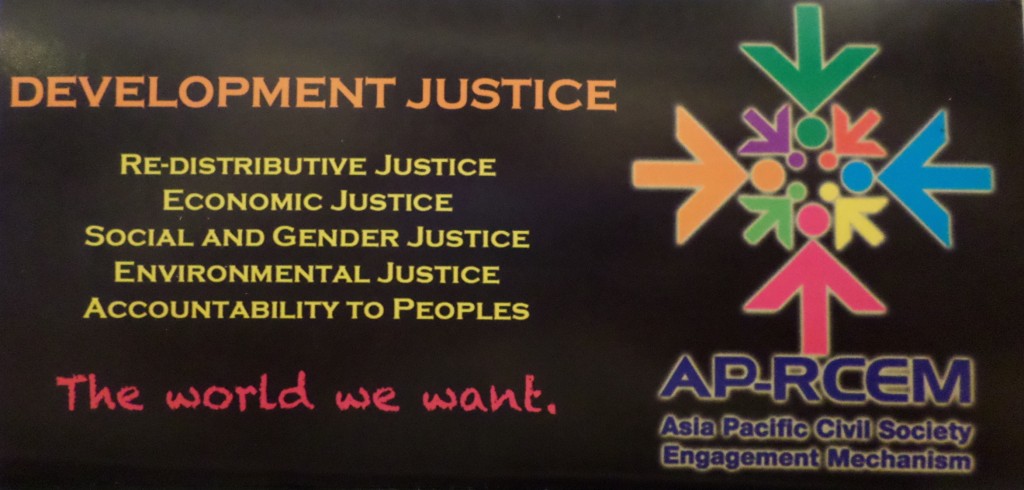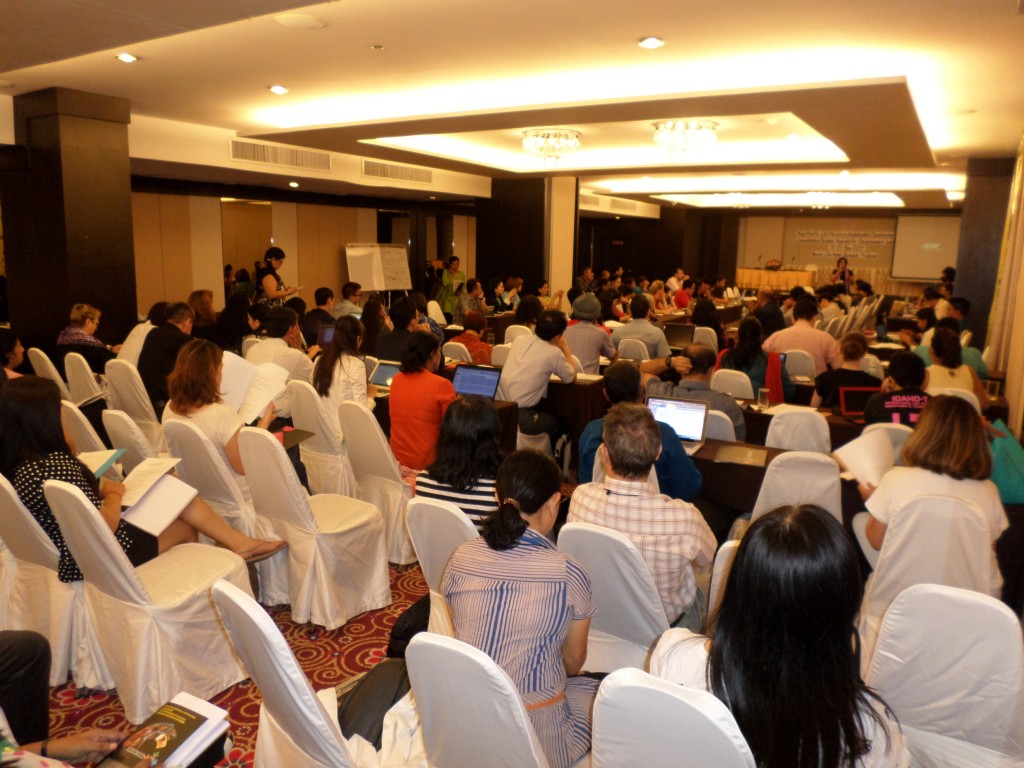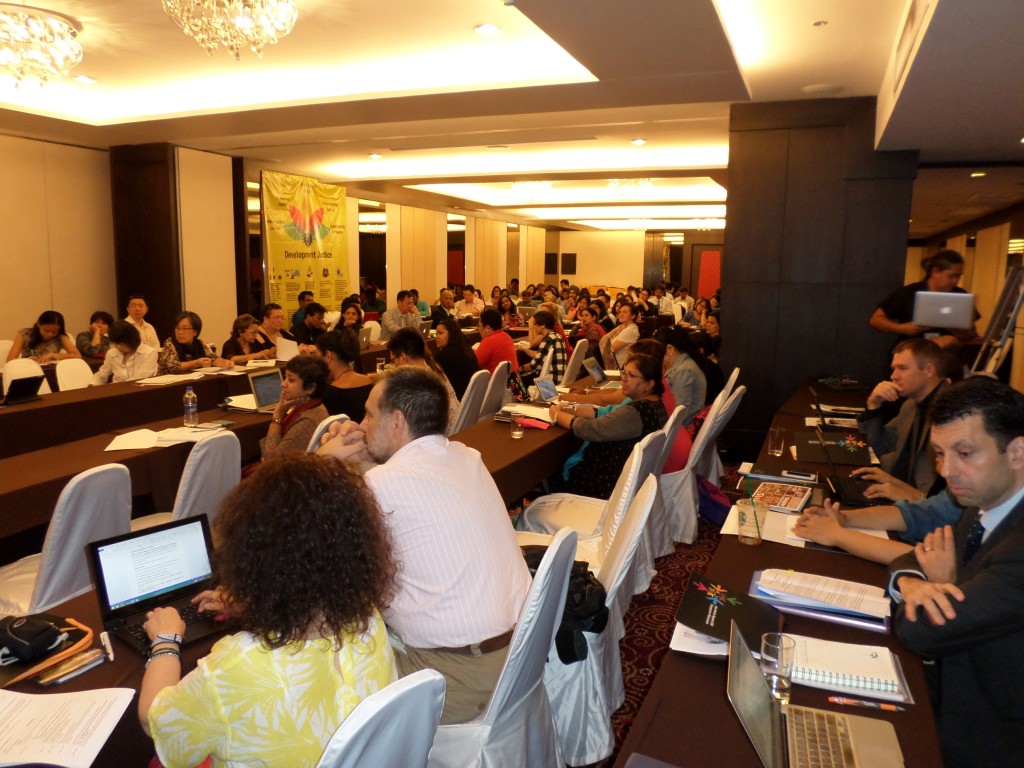
25 May, 2015
Global poor pay the price of crises caused by the uber-rich: Civil Society groups
Bangkok — The global uber-rich who control the vast majority of the world’s wealth are responsible for an equivalent proportion of global problems, while the billions of poor pay the heaviest price, according to a caucus of Asia-Pacific civil society (CSOs) that concluded here on 18 May 2015.
Representatives of 125 non-governmental organisations, convening in Bangkok in the first of a series of high-level United Nations-related meetings, decried what they called the multiple crises caused by the decision-makers of the global capitalist system, including the widening rich-poor income gap, massive unemployment of up to 48% amongst the youth in some countries, and large-scale environmental degradation and depletion of natural resources.
 ============ |
 =========== |
 =========== |
They called on the UN and world governments to introspect on the root causes of these converging crises and strive to create a equitable model of development that delivers justice alongside sustainability. In line with their mandate to hold global governments, corporations and international institutions accountable, they spent much time dissecting the hidden agendas and the geopolitical and economic machinations that allow the status quo to remain unchanged, effectively the serving the interests of the global uber-wealthy.
In one of their key positions, they demanded answers on why the UN does not acknowledge the harmful impact of militarism, seek accountability of the military-industrial complexes in the developed countries and tax the arms trade which can provide both revenue and promote peace. “There is no recognition of the considerable impact of human rights violations by the state due to militarism, especially those who demand justice, equity and /or right of self-determination,” according to one report produced by the NGOs.
The views were expressed at a meeting of the Asia Pacific Regional CSO Engagement Mechanism (APRCEM), a civil society platform which works to ensure that voices of grassroots and peoples’ movements in the Asia Pacific are heard in regional and global intergovernmental processes.
Set up under the auspices of the UN Economic & Social Commission of Asia and the Pacific (UNESCAP), the APRCEM platform represents civil society groups from 17 constituencies (women, farmers, fisherfolks, SME, indigenous peoples, NGO, science and technology, older group, people with disabilities, people living and affected by HIV, migrants, trade union and workers, local authorities, youth, children and adolescent, urban poor, LGBTIQ, and people displaced by conflict, disasters and climate change), and 5 sub-regions (South East Asia, South Asia, Central Asia, East Asia and the Pacific).
During the entire APRCEM forum, the reports, studies and presentations proved how the civil society groups are striving to keep tabs of governments, corporations and international financial institutions. They are sending a clear warning that behind the scenes, a growing movement is under way to slowly privatise everything, from public services such as health and education to agriculture and infrastructure. Over time, this will put multinational corporations in the global driving seat, make them bigger and more powerful than they already are, and make democratically-elected governments virtually irrelevant in terms of policy-making.
The APRCEM forum was the first of a series of meetings being organised in Bangkok between May 19-29 by the UN ESCAP in cooperation with the UN Environment Programme (UNEP) and the UN Conference on Trade and Development (UNCTAD) to discuss the post-2015 development agenda. The meetings are intended to take stock of the success and failures of the 2001-15 Millennium Development Goals (MDGs) agenda and chart a new agenda for the next 15 phase, which has been renamed Sustainable Development Goals (SDGs).
The 15-year MDG agenda identified eight goals. The next SDGs agenda has been expanded to 17 goals and 169 targets. Negotaitions are under way on the draft of the SDGs which is to be finalised in a series of UN meetings this year. This month’s meetings at UNESCAP are designed to reflect the Asia-Pacific perspectives. Separate forums are also being held by UNEP with regional stock exchanges, corporations and judges, culminating in the annual ministerial summit of ESCAP between May 27-29.
The NGOs under the APRCEM umbrella say that these meetings, held with a great deal of fanfare and protocol, are couched in diplomatic niceties and generate lofty speeches, reports and statements which identify all the myriad of global problems facing the world. But they do not acknowledge mistaken policies of the past, avoid specifying who should be held accountable, nor consider alternative paradigms and pathways of the future.
With the Asia-Pacific region representing 60% of the world’s population including 2/3 of the world’s indigenous peoples, which belong to the world’s poorest of the poor, there is a real fear that the SDGs will be another disguised attempt to promote the same flawed policies and development agendas of the past.
A position paper distributed at the APRCEM meeting says, “Today, we find ourselves in a world defined by deep and entrenched inequalities – inequality in wealth, power, and resources between countries, between rich and poor and between men and women. The current dominant architecture of development has resulted in wealth being concentrated in the hands of a tiny minority of obscenely rich individuals.
“Globally, the 85 richest people in the world have as much combined wealth as the 3.5 billion poorest, which is half of the world’s population,[OXFAM, 2014, Working for the Few: Political Capture and Economic Inequality, OXFAM Briefing Paper 178, http://www.oxfam.org/ sites/www.oxfam.org/files/bp-working-for-few-political-capture-economicinequality-200114-en.pdf] and 80% of the world’s population still lives on less than $10 per day [A Shah, Poverty Facts and Stats, Global Issues, accessed 28 October 2014, http://www.globalissues.org/article/26/poverty-facts-andstats#src1]. In Asia Pacific, 0.001% of the population own 30% of the region’s wealth. These few people own seventeen times more wealth than the least developed countries in Asia combined [Wealth-X and UBS (2014)].
It adds, “The historical inequality of power between states has led to deeply inequitable economic architecture that has diminished the capacity of states to meet their economic, social and cultural human rights obligations. It has created rules that benefit multi-national corporations, push down wages, and privatise public resources. Unsustainable consumption and production have led to massive extraction of natural resources, environmental degradation, and large scale land grabbing.”
The paper says that existing economic and political arrangements are now creating a situation where the Earth’s planetary boundaries are being rapidly exceeded, leading towards catastrophic climate change. “Gender inequality and violations of women’s human rights remain a persistent and entrenched problem fuelled by globalisation, militarization and growing fundamentalisms.”
The paper demands that the negotiations to decide the post-2015 SDGs should address these “converging and interrelated crises of inequalities and climate change.”
It notes that since their first meeting in 2013, “civil society in Asia and Pacific has called for a new development model, a model of Development Justice. Development justice is a transformative framework for development that aims to reduce inequalities of wealth, power, and resources between countries, between rich and poor, and between men and women and other social group.
“It places people – that is the majority poor and the marginalized – at the heart of development. It is a paradigm that recognises the importance of sustaining the Earth’s planetary boundaries over sustaining profits. Development justice requires past injustices to be remedied and new just, sustainable and democratic systems to be developed.
“Development justice is grounded in five transformational shifts: Redistributive Justice, Economic Justice, Gender and Social Justice, Ecological Justice and Accountability to Peoples. It has been discussed in civil society and intergovernmental spaces in the region and globally. It has been used as a framework to analyse the outcome documents of key forums on sustainable development, including the post-2015 development agenda.”
Another APRCEM paper cites the following major obstructions blocking the implementation of a Development Justice agenda:
(+) Lack of political stability and inadequate political commitments;
(+) Corruption relating to embezzlement of donor funds and national and local government funds, and in staff recruitment and promotion;
(+) Lack of technical expertise in development countries;
(+) Inadequate budgetary allocation to development and transparency in budgeting
(+) Dependency on foreign aid hindering potential for domestic resource mobilization;
(+) Trade imbalance between countries adversely affecting economic growth;
(+) Limitations imposed upon civil society, freedom of media/expression, and participation of local government leaders, in the name of democracy and national security;
(+) Centralized governance and fiscal systems; and,
(+) The majority of foreign aid being invested through government, with only a portion of funds reach CSOs, and funds largely failing to help poor and target populations.
Says the paper, “The Post-2015 development agenda should acknowledge that achieving development justice requires addressing various issues of poverty, hunger, gender inequality, health, including sexual and reproductive health and rights, and their root causes, holistically, and that these issues are intertwined.”
Another analysis of the SDGs says they “fail to convincingly address one of the biggest structural impediments to just and equitable development, which is the asymmetrical international economic order that has historically stripped developing countries of their resources and limited their domestic policy space to implement development and human-rights oriented decisions. This imbalance is evident in the functioning of international trade and finance, capital markets, investments and international financial institutions and agencies, which not only favour developed countries, but also favour corporate interests in developed counties above all else.”
Numerous examples were cited about how multinational corporations are taking greater control over production and markets through their “value-chains”. They are targeting a new wave of privatisation with the aim of capturing sectors that were previously public domain, such as water and sanitation services, education, health, pension systems, etc.
In the field of agriculture, for example, one of the NGOs said, small farmers are becoming more dependent on corporate-controlled seeds, pesticides, production inputs, etc. This is increasing their gross incomes but the higher costs are diminishing their net incomes.
Another NGO pointed out that currencies are affected by excessive investment deregulation which facilitates foreign direct investments but also gives rise to speculative capital and diminishes the policy space of finance authorities to establish stable exchange rates.
In the field of technology, it was pointed out, developed countries are using foreign aid money as a basis for transfer of technology, which means the money goes back to buying products for which licenses and patents are already owned by the multinational corporations. The next target of the developed countries and their MNCs is to take control of vast treasure trove of traditional knowledge in the developing countries.



Liked this article? Share it!